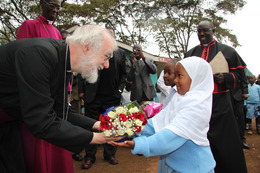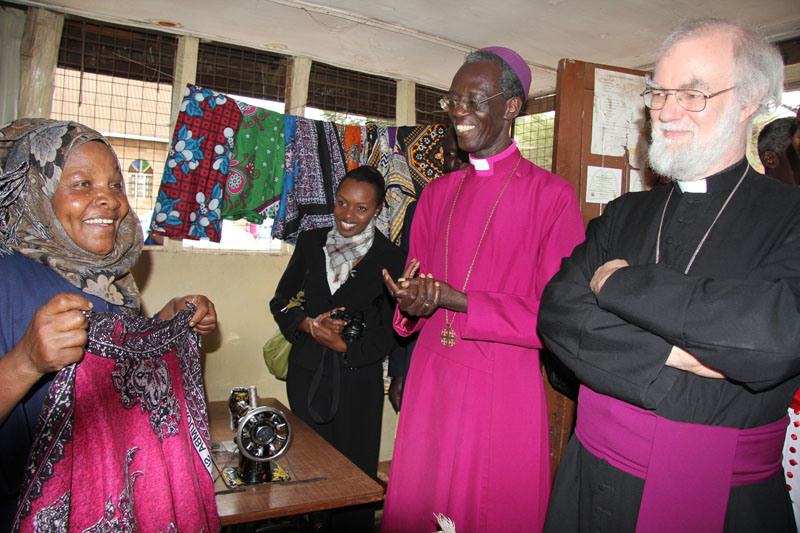Archbishop’s visit to Kibera, Nairobi
 The Archbishop is welcomed to Kibera
The Archbishop is welcomed to KiberaThursday 23rd June 2011
On the final day of his visit to Kenya, the Archbishop of Canterbury, Dr Rowan Williams, spent the morning in Kibera, one of Africa's largest slums with a population of 700,000 living in an area of 600 acres.Kibera has all the problems that are the result of extreme overcrowding and poverty - unemployment, extortion, and substance and alcohol abuse to name a few. The Archbishop was welcomed at the church of the Holy Trinity in Kibera where he was able to learn about the work of the Centre for Urban Mission  whose aim is to transform the informal settlements through the ministry of the local churches. There followed a tour of several initiatives located within the precincts of Holy Trinity, including a tailoring project for vulnerable women, teaching them a skill with which they can turn their lives around and feed their families.
whose aim is to transform the informal settlements through the ministry of the local churches. There followed a tour of several initiatives located within the precincts of Holy Trinity, including a tailoring project for vulnerable women, teaching them a skill with which they can turn their lives around and feed their families.
Dr Williams was also taken around the corrugated iron classrooms of the church school, where children from the slums are given not only an education but also regular meals. Many of the children are left from a very young age to grow up on the streets as their parents leave in the early hours of the morning to try to get employment and food. Schools therefore provide a safe place as well as an education.  The Centre for Urban Mission also identified a need for after-school homework clubs as they found many of the children were trying to beat the clock and complete their homework before sunset - once darkness had come, they had no electric light to work from - as well as the issue of space with the homes in the slum being so overcrowded. The teachers at the school were very proud that they had taught two children from Kibera who had then gone on to study at university, a huge achievement in an area of such extreme poverty.
The Centre for Urban Mission also identified a need for after-school homework clubs as they found many of the children were trying to beat the clock and complete their homework before sunset - once darkness had come, they had no electric light to work from - as well as the issue of space with the homes in the slum being so overcrowded. The teachers at the school were very proud that they had taught two children from Kibera who had then gone on to study at university, a huge achievement in an area of such extreme poverty.
Speaking about his morning in Kibera, the Archbishop praised the remarkable work being done by the local churches:
"The work being done here is so inspiring because it shows what can be done when people are prepared to identify the problems that they face - not as someone else's issue, not as doing good to someone else, but actually standing alongside as God in Christ stands alongside - that is the beginning and end of all real Christian mission and service."
The Archbishop concluded his visit to Kibera by giving a homily at Holy Trinity Church in which he spoke about the meaning of Emmanuel – 'God with us', explaining how God is at work in every human being and every part of the universe, restoring hope to those whose situation may seem hopeless, and being ever present in the face of those we live amongst and serve.
The full text of the Archbishop's homily follows.
Your Grace the Archbishop of Kenya and brothers and sisters in Jesus Christ, I bring you greetings from your friends and brothers and sisters in the Church of England who give thanks for you all and prayer for you and hope that you prayer for them. I greet you in the name of Jesus on behalf of all those in the Church of England, who are part of the same great Anglican Family.
Now I noticed this morning that one of the local churches is called Emmanuel, and what does the name Emmanuel mean – it means 'God with us' - and that is a very good name for a church. It is a good name because we are in the church, we belong to the church because we believe that God is with us. God is not distant, God is not on the other side of the universe a journey away by spaceship, God is with us – he has decided to be here with us. In Jesus Christ he has lived a human life and all his power and love pour out through Jesus Christ, through the blood of the cross and the power of the resurrection – Emmanuel, God with us. And that is why we are Christians, because God has chosen to be here with us and among us. But then comes the challenge to us, if God is with us are we willing to be with our neighbour? Or would we rather like to be on the other side of the universe. God does not stay distant in heaven God comes to be with us. Do we stay distant from our neighbour? No, by the grace of God, we seek to be with our neighbour in the name of God. And that is the second great truth about being in the Church - first God has come to be with us and called us around him and, second, he has called us to be with our neighbour in just the same way. And what I have seen this morning in Kibera is a wonderful sign of how we in God's name can be with our neighbour, and the work of the Urban Mission Centre, the work that I've been hearing about in so many ways, the work of the school – all this is about being with our neighbour, in the name of God - not being far off, being in the midst of life.
So God is with us and has called us around him in Jesus Christ. Next God tells us to be with our neighbour, to be where our neighbour is, to find out what they need and to be there with them. But there is a third thing too and this morning saw it illustrated when the children from St Nicholas school sang to us about that great episode in the gospel where Jesus tells us about the end of time when we shall all be judged on whether we have seen him in the faces of those we serve. I was hungry and you gave me food, I was thirsty and you gave me drink, I was naked and you gave me clothing, I was sick and you visited me, I was in prison and you ministered to me. And people will say 'we never did any of these things for you', and Jesus says 'because you did them for the least of my brothers and sisters, you did them for me'. And so that is the third thing - we seek to be with our neighbours in the name of Jesus. Yet God is already with our neighbours, God is already at work around us. And when we try to serve the needs of those who are hungry or thirsty, who are without clothing, who are sick or in prison, who are we serving? We are serving Jesus; God is with us in those we serve, just as he is in our serving of them. Because there is no place in the world where God is not present, even when we look around at what seems to be a scene of great poverty, of great suffering, of great darkness or trial - God is there already, God is at work already, preparing hearts, preparing minds and lives, so that his grace may bring something to life.
So we look around at what may be a scene without much hope, and yet we say God is with us, Emmanuel, God is with us, he is already at work beginning to prepare the ground, he has sown the seeds of new life in the lies around. And so here in Kibera God is with us, he is with every person in this area, he seeds have been sown in their lives, he is preparing them for renewal, preparing them to be changed. And when we come to serve them in God's name, to be with them in God's name, we are not bringing God to a place where he has never been before, God is not like a visitor from England who has to be introduced and shown around, God is already a native here – God lives here. God is at work already.
And so when we come we don't bring God like a visitor, we say to God 'show us where you are already at work', 'show us where the seeds are that are already growing in life here and we will work with you and we will bring those seeds to flower, we will bring what you are doing God, fully into the light, and together we shall show your glory'. That is also what we mean by saying Emmanuel, God with us. So we give God thanks first of all that he has come amongst us in Jesus Christ that he has decided once and for all to be our God, and to be in the very heart of the world, calling us around him - his friends, his disciples - God wants us to be with him, he loves our company, scripture says that the wisdom of God delights in the children of men. The wisdom of God takes joy in human beings, in every person in this church and in every person in this city, every person in this world, the wisdom of God is delighted with us. And in Jesus Christ, the God who takes delight in human beings has called his friends to be around him - for that first, we give God thanks. And then we pray to God for the strength, the courage to be alongside those who need serving. We pray that we may have that strength to be with them in the name of God, to show the face of God to them, to be Emmanuel for them. God with them, through our love, through or service, and for that need a lot of strength, we need a lot of thought, we need a lot of patience – but God will give us that power in his spirit.
And then thirdly, we pray that God will show us where he is already at work, will show us the face of Jesus in those we serve, will show us in the small child, in the old person, in the sick person, in the dying person, the prisoner, the stranger, the outsider, the person we're afraid of as well as the person we know very well, but in all those faces God will show us that he is already moving, already working, and our prayer must be that together with them, we bring God's glory to light. And together, in serving and being served, we show God to the world. We show the world that we have God who is Emmanuel, God with us. Not only in a church dedicated to Emmanuel, but in every church we seek that Emmanuel calling, that Emmanuel witness. I pray that in this diocese with all it's wonderful work, in the name of God, being there with the neighbour for the sake of God, in this diocese that Emmanuel vision will hold us all together, give us strength and vision for the future so that God's name will be glorified here and throughout this city, God who is Emmanuel, God with us. God bless you in your work and your witness, God be thanked for what you do, what you have done, and what you will do in his name. Amen
